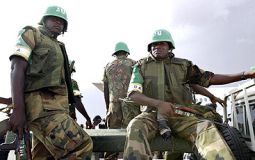AU troops help reduce ceasefire violations in Darfur – report
Dec 15, 2005 (KHARTOUM) — The presence of African Union troops in Sudan’s troubled Darfur region has helped to reduce violations of a fragile ceasefire between the Sudanese government and rebels, according to a statement issued Thursday by a team of experts that recently toured the area.
 The AU Assessment Mission, headed by Ambassador Baba Gana Kingibe, AU special representative to Sudan, however, acknowledged that the security situation still does not allow for the return of internally displaced persons and refugees in significant numbers.
The AU Assessment Mission, headed by Ambassador Baba Gana Kingibe, AU special representative to Sudan, however, acknowledged that the security situation still does not allow for the return of internally displaced persons and refugees in significant numbers.
“The presence of the African Union Mission in Sudan (AMIS) has contributed to reducing the number of cease-fire violations and afforded some level of protection for the delivery of humanitarian assistance,” said the statement issued at the AU headquarters in El Fasher, the capital of North Darfur.
The AU presence also enabled IDPs to cultivate and harvest in certain areas of Darfur, and this, in conjuction with humanitarian efforts by the international community, has considerably reduced malnutrition and mortality rates, the report said.
It said the return of refugees and the IDPs was hampered by “banditry, harassment of civilians and tensions and skirmishes between ethnic communities which are rife throughout Darfur and remain an unresolved security challenge.”
An April 2004 cease-fire has been repeatedly violated by intermittent rebel attacks against the peacekeepers, civilians and humanitarian workers.
The experts visited the eight areas where some 7,000 AU peacekeepers — including military observers and civilian police — are deployed: El Fasher, Nyala, El Geneina, Kabkabiya, Tine, Zalingei, El Daien and Kutum.
The findings of the Assessment Mission will form the basis of recommendations the AU Commission will make to the AU Peace and Security Council in January 2006 on how to further enhance the effectiveness of the AU forces in Darfur, the statement said.
The experts team included representatives from troop-contributing countries Gambia, Nigeria, Rwanda and Senegal and members of the Darfur Integrated Task Force from the AU headquarters in Addis Ababa. AU partners Canada, Norway, the United States, the European Union and the United Nations were also represented.
The United Nations estimates that 180,000 people have died, mainly through famine and disease, and several million more have either fled into neighboring Chad or been displaced inside Sudan since the conflict began in February 2003, when two African rebel groups took up arms against the Sudanese government amid accusations of repression and unfair distribution of wealth.
(AP/ST)
